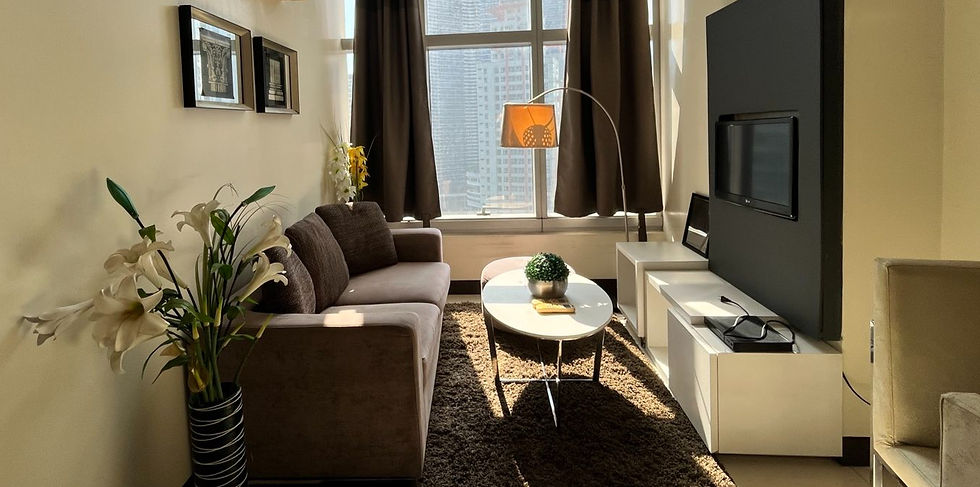Moving to Manila? 7 Key Things to Know About the Manila Real Estate Market
- bedandgoinc
- 2025年5月30日
- 読了時間: 4分
May 30, 2025
Manila is a city that blends vibrant culture, modern infrastructure, and economic opportunity — making it a top relocation choice for professionals, retirees, and expat families alike. But before making the move, understanding the local property market is essential. Whether you're planning to rent a condo in a bustling business district or invest in a long-term property, the Manila real estate landscape has its own set of rules, trends, and opportunities.

This blog is your comprehensive overview of what to expect when entering Manila's real estate scene — from ownership restrictions and rental prices to navigating legal procedures and choosing the right neighborhood. If you're planning to call the capital of the Philippines your new home, here's what you need to know to make smart, confident property decisions.
1. Manila's Housing Landscape Is Diverse and Fast-Paced
Manila's property market is defined by its variety. Whether you're eyeing the upscale skyline of Bonifacio Global City (BGC), the urban convenience of Makati, or quieter suburban hubs like Quezon City or Alabang, there are options for every lifestyle and budget. Condominiums are the dominant form of residential real estate in central Manila — ideal for professionals, couples, or small families seeking proximity to offices, malls, and international schools.
Townhouses and house-and-lot properties are more common in residential zones and are often found in gated subdivisions. These offer more space but are farther from Manila's high-density business districts.
2. Foreign Ownership Has Restrictions — But There Are Workarounds
Foreigners cannot own land in the Philippines, but they can legally own condominium units, provided that foreign ownership in the entire building does not exceed 40%. This makes condo living the most accessible route for expatriates and foreign investors. Leasing long-term land (up to 50 years) is possible for those seeking other property types, though it requires legal and financial guidance.
It's wise to work with a reputable real estate agent and legal advisor to navigate ownership options, title checks, and contract procedures.

3. Rental Prices Vary Widely by Location and Lifestyle
Rental rates in Manila differ depending on location, building quality, and included amenities. In first quarter of 2025, a studio or one-bedroom condo in BGC or Rockwell might rent for PHP 35,000–PHP 70,000 per month, while more affordable areas like Mandaluyong or Pasig offer similar spaces for PHP 20,000–PHP 30,000.
If you're relocating for work, consider renting near your office to avoid Manila's notorious traffic. Many condos come fully furnished, which is a plus for expats seeking immediate move-in convenience.
4. Most Properties Are Found Through Agents and Online Platforms
The most reliable way to secure a property is through licensed brokers, trusted developers, or digital platforms that cater to foreigners. Sites like Berenta PH, DotProperty, and Lamudi provide property listings tailored to international clients. Brokers often offer full-service support, including virtual tours, negotiations, and local guidance.
Make sure to validate credentials, read lease terms carefully, and clarify any fees (like association dues or maintenance costs) before signing.

5. Manila's Property Market Remains Investment-Friendly
Despite economic fluctuations, Manila's property market continues to be resilient, particularly in high-growth areas like Taguig, Makati, and Ortigas. Condominiums in key districts tend to retain value and generate steady rental income — making them attractive to foreign investors.
In fact, pre-selling units from reputable developers allow buyers to enter the market at lower prices, with the opportunity for capital appreciation as the property is built and occupied. However, careful due diligence is essential — check developer reputation, construction timelines, and turnover conditions.
6. Prepare for Local Costs, Taxes, and Processes
Buyers and renters alike should prepare for the legal and financial side of real estate. Aside from the purchase price or rent, you may encounter:
Documentary stamp taxes and transfer fees (for buyers)
Real property taxes
Condo dues or maintenance fees
Advance payments and security deposits (for renters)
Property purchases often involve several steps: letter of intent, reservation agreement, contract to sell, and deed of absolute sale. Foreigners are also encouraged to open a local bank account and hire a local attorney for smoother transactions.
7. Community and Amenities Matter More Than Ever
Today's Manila condominiums are more than just buildings — they're lifestyle hubs. Modern high-rises offer everything from pools and gyms to co-working lounges and convenience stores. Proximity to transportation (MRT/LRT, expressways), healthcare, and international schools is a major plus for foreign residents.
It's not just about square footage — it's about living in a place that enhances your daily life. Always visit the neighborhood, explore the building amenities, and assess the commute and walkability before committing.

Know Before You Go
Manila offers a vibrant lifestyle with a growing real estate market, but it also presents unique challenges for foreign movers. By understanding the property types, legal limitations, rental norms, and investment climate, you can make better decisions and avoid costly surprises.
Whether you're renting a stylish studio in BGC, buying a condo in Makati, or investing in a pre-selling unit in Ortigas, local knowledge is key. Partner with trusted professionals and stay informed — Manila might just be the perfect place to call home.
SOURCE:









コメント